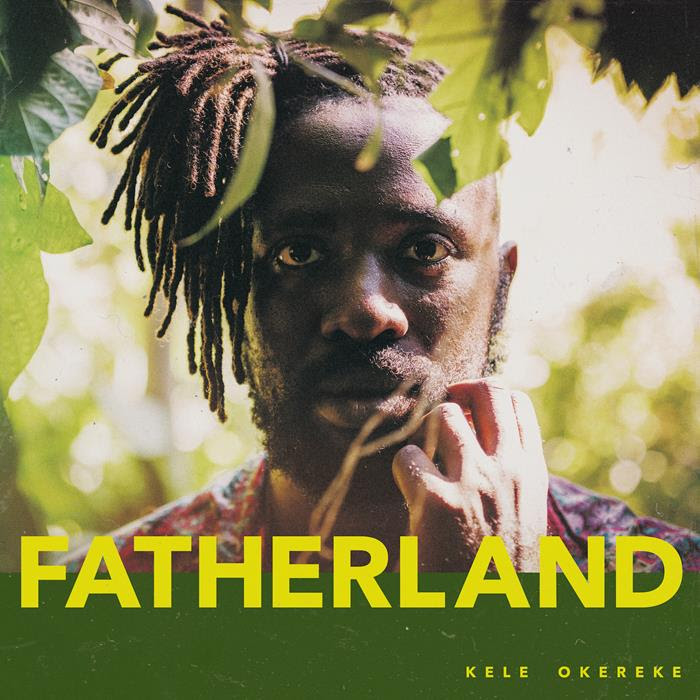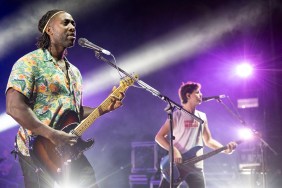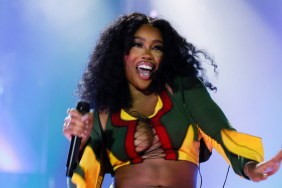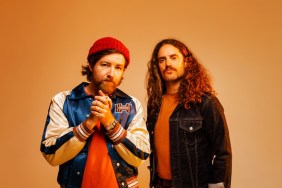Kelechukwu “Kele” Okereke, frontman of the revered indie-rock band Bloc Party, might be the UK’s most prolific – and versatile – music-maker.
In January of 2016, Bloc Party unveiled their fifth album, HYMNS – Okereke and guitarist Russell Lissack joined by new bassist Justin Harris (from Portland’s experimental rock combo Menomena) and drummer Louise Bartle. Now Okereke is back already with his third solo album, Fatherland. Symbolically, he’s using his full name over the mononym ‘Kele’. And Fatherland is like N.O.T.H.I.N.G. Okereke has done before.
With earlier side-projects, the Londoner delved ever more into electronic dance music – influenced by his moonlighting as a DJ. In 2014 Okereke presented Trick, elevating underground bass-house with his soulful vocals. Still, Trick was less about ‘bangerz’ than music to chill to post-clubbing.
Ostensibly, Okereke began to miss playing guitar, but he wasn’t in the headspace to cut Bloc Party’s classic brash rock. After all, even HYMNS was surprisingly tranquil. Okereke introduced gospel and blues into Bloc Party’s electro paradigm – soliciting London Grammar associates Tim Bran and Roy Kerr to produce. And so, while Okereke has again picked up a guitar for Fatherland, it’s an acoustic instrument. Indeed, he’s re-emerged as a singer/songwriter – Fatherland an orchestral folk and soul album. Okereke recorded it in Portland, working with Harris as producer – and bringing in other local musicians. Fatherland could have surfaced on Communion Records – the label fronted by Mumford & Sons’ Ben Lovett and identified with London’s nu-folk movement.
Crucially, Fatherland is deeply personal. Last December Okereke, openly gay, became a father to daughter Savannah with his long-time partner (the bub has a sweet song named for her). Though Okereke conceived Fatherland as a collection of lullabies, it’s evolved into something else. He expresses the joys and trepidations of approaching first-time paternity.
‘Streets Been Talkin”, a lavishly-arranged number with ‘Blackstar’-like horns, sets the tone. His enunciation clipped, Okereke sings about trading in a life of partying for domesticity – yet the song betrays a reflective brittleness. “From the palace of Versailles/To the streets of Peckham Rye/You craved the dizziest of heights/But were caught out at the lights.”
Okereke also explores his family’s rich Nigerian heritage. The first single ‘Yemaya’ – acoustic guitar balladry with delicate strings – takes its title from the Yoruba water goddess (and protector of women). More narrative is ‘Road To Ibadan’ – which tells of Okereke’s bonding with his own dad on a return trip to Africa.
Fatherland’s most alluring track, ‘Grounds For Resentment’ is a jaunty, sax-laden duet with Years & Years’ Olly Alexander. It manages to be simultaneously sexy, romantic and wryly domestic. Alexander has long spoken about the significance of gay performers being free to emote relevant pronouns – and, Okereke revealed in a web chat, this resonated with him. Alas, the hushed ‘Versions Of Us’ with Corinne Bailey Rae simply can’t compete.
Fatherland‘s musical stand-outs tend to be those songs that continue Okereke’s instinctive predilection for genre-crossing – his Nick Drake acoustic otherwise dominating. ‘You Keep On Whispering His Name’ is stealth dub-reggae – Okereke fretting about a lover’s possible cheating. In fact, Fatherland has moments that are idiosyncratic even for Okereke. The Brit has apparently been revelling in musical theatre – and the piano-thumping ‘Capers’ is archly vaudevillian, complete with whistling.
Inevitably, there will be Bloc Party fans who won’t be feeling Fatherland. Some will always hanker for a replica of 2005’s seminal debut Silent Alarm – or just guitar rock. HYMNS was one of 2016’s underrated albums – critics disconcerted by Bloc Party V 2.0. But Fatherland is touchingly intimate, candid and, yes, gorgeously progressive.
–
‘Fatherland’ is out today.












